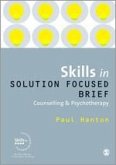John N Moritsugu, Elizabeth M Vera, Jane K Harmon Jacobs, Melissa J Kennedy
Psychology of Adjustment
The Search for Meaningful Balance
Schade – dieser Artikel ist leider ausverkauft. Sobald wir wissen, ob und wann der Artikel wieder verfügbar ist, informieren wir Sie an dieser Stelle.
John N Moritsugu, Elizabeth M Vera, Jane K Harmon Jacobs, Melissa J Kennedy
Psychology of Adjustment
The Search for Meaningful Balance
- Loseblattsammlung
- Merkliste
- Auf die Merkliste
- Bewerten Bewerten
- Teilen
- Produkt teilen
- Produkterinnerung
- Produkterinnerung
A text for today′s world, Psychology of Adjustment helps readers to understand and adjust to life in a context of continuous change, challenge, and opportunity.
Andere Kunden interessierten sich auch für
![Introduction to Biopsychology Introduction to Biopsychology]() Andrew P WickensIntroduction to Biopsychology227,99 €
Andrew P WickensIntroduction to Biopsychology227,99 €![Introduction to Clinical Psychology Introduction to Clinical Psychology]() Douglas A BernsteinIntroduction to Clinical Psychology144,99 €
Douglas A BernsteinIntroduction to Clinical Psychology144,99 €![Child Health Psychology Child Health Psychology]() Julie Turner-CobbChild Health Psychology213,99 €
Julie Turner-CobbChild Health Psychology213,99 €![Solution-Focused Therapy Solution-Focused Therapy]() Alasdair MacdonaldSolution-Focused Therapy165,99 €
Alasdair MacdonaldSolution-Focused Therapy165,99 €![A Short Introduction to Counselling Psychology A Short Introduction to Counselling Psychology]() Vanja OrlansA Short Introduction to Counselling Psychology159,99 €
Vanja OrlansA Short Introduction to Counselling Psychology159,99 €![Skills in Solution Focused Brief Counselling and Psychotherapy Skills in Solution Focused Brief Counselling and Psychotherapy]() Paul HantonSkills in Solution Focused Brief Counselling and Psychotherapy151,99 €
Paul HantonSkills in Solution Focused Brief Counselling and Psychotherapy151,99 €![Essential Biological Psychology Essential Biological Psychology]() Jim BarnesEssential Biological Psychology183,99 €
Jim BarnesEssential Biological Psychology183,99 €
A text for today′s world, Psychology of Adjustment helps readers to understand and adjust to life in a context of continuous change, challenge, and opportunity.
Produktdetails
- Produktdetails
- Verlag: Sage Publications
- Seitenzahl: 432
- Erscheinungstermin: 24. Oktober 2016
- Englisch
- Gewicht: 936g
- ISBN-13: 9781506364346
- ISBN-10: 1506364349
- Artikelnr.: 45231366
- Herstellerkennzeichnung
- Libri GmbH
- Europaallee 1
- 36244 Bad Hersfeld
- gpsr@libri.de
- Verlag: Sage Publications
- Seitenzahl: 432
- Erscheinungstermin: 24. Oktober 2016
- Englisch
- Gewicht: 936g
- ISBN-13: 9781506364346
- ISBN-10: 1506364349
- Artikelnr.: 45231366
- Herstellerkennzeichnung
- Libri GmbH
- Europaallee 1
- 36244 Bad Hersfeld
- gpsr@libri.de
Preface
About the Author
PART 1- Perspectives and Processes
Chapter 1- Adjustment: A Life Process
Adjustment
Defining Adjustment
Determining Adjustment in Individuals
Goodness of Fit
Lack of Problems
Positive Life Experiences
Mind-Body Health
ADJUSTMENT IN PRACTICE: Sleep Matters
RESEARCHING ADJUSTMENT: Biofeedback
Types of Change
Change Throughout Human Development
RESEARCHING ADJUSTMENT: Erikson's Psychosocial Development-College to
Midlife
RESEARCHING ADJUSTMENT: Positive Psychology
Societal Change
Perceptions of Change
Change Can Be Stressful
Positive and Negative Change Events
Planned and Unplanned Change
Comprehensibility of Change
Traditions Contributing to Adjustment
Interdisciplinary Approaches
Psychoeducation
Organization of This Book
Conclusion
Chapter 2- Purpose in Life
Existential Psychology
Change, Impermanence, and Awareness of Death
Experimental Existential Psychology
The Importance of Purpose and Meaning
Coherence
Purpose in Life
Existential Hardiness
RESEARCHING ADJUSTMENT: Academic Hardiness and Grit
Spirituality and Religion
Intrinsic and Extrinsic Orientation (Individual and Social)
ASPIRES (Assessment of Spiritual and Religious Sentiments)
ADJUSTMENT IN PRACTICE: Five-Factor Theory of Personality
Effects of Religion and Spirituality on Health
RESEARCHING ADJUSTMENT: Neurological Effects of Religious Belief
Religion, Spirituality, and Meaning
Note on Our Perspective
Autonomy, Choice, and Free Will
ADJUSTMENT IN PRACTICE: Creating Choice Conditions
Conclusion
Chapter 3- Community Contexts
Mentoring
Social Support
Types of Social Support
Social Networks
Indegree Centrality and Brokerage
Basic Rules of Networking
Social Capital
The Importance of Situation or Context
Person by Situation Interactions
Ecological Psychology and Behavioral Settings
RESEARCHING ADJUSTMENT: Context and Identity
Discriminative Setting Stimuli
Two Powerful Social Effects
Conformity
Obedience to Authority
ADJUSTMENT IN PRACTICE: In-Group, Out-Group
Culture
Collectivist Versus Individualistic Cultures
Cultural Complexes
Developmental Psychopathology
RESEARCHING ADJUSTMENT: Gene X Environment Interaction
Resilience
The Maturation and Socialization Process
Conclusion
Chapter 4- Experience and Learning
Pavlovian Conditioning
The Basics of Pavlovian Conditioning
Preparedness in Behavior Acquisition
Operant Conditioning
Discriminative Stimulus
Response, Behavior, or Operant
RESEARCHING ADJUSTMENT: Hebb's Rule
Consequences: Feedback, Reinforcement, Punishment, or Nothing
ADJUSTMENT IN PRACTICE: Avoidance Learning
Consequences That Are Predictable But Not Always There
ADJUSTMENT IN PRACTICE: Premack Principle
Shaping
ADJUSTMENT IN PRACTICE: Self-Control
Cognitive Behaviorism
Social Learning
Modeling
Perceived Self-Efficacy
Collective Efficacy
Learning Probabilities (Statistical Learning
Implicit and Explicit Learning
Cognitive Development
Jean Piaget
Lev Vygotsky
Active Learning
Conclusion
Chapter 5- Mindfulness: A Path to Awareness
Mindfulness and Meditation
Defining Mindfulness
Defining Meditation
ADJUSTMENT IN PRACTICE: Meditation Exercise
History of Psychology and Mindfulness Research and Practice
Origins of Mindfulness Practice
Research on Meditation and Mindfulness
Bridging Science and the Meditation Experience
Mindfulness in Practice
Mindfulness and Nonjudgmental Awareness
Mindfulness Promoting Self-Regulation
ADJUSTMENT IN PRACTICE: A Week of Mindfulness
Mindfulness Promoting Compassion
ADJUSTMENT IN PRACTICE: Create a Loving-Kindness Meditation
On the Mindful Path: Moving Toward Action
The Beginning of Action and Change
The Foundation for Action
ADJUSTMENT IN PRACTICE: What Do I Value?
The Path to Change
Moving Toward Commitment and Change
Conclusion
Chapter 6- Stress, Health, and Well-Being
Stress
Stressors
RESEARCHING ADJUSTMENT: Measuring Stress
Stress Processes
Stress Reactions
Coping
Emotion-Focused and Problem Solving-Focused Coping
Active Coping and Avoidant Coping
Coping With Controllable Versus Uncontrollable Stressors
Coping With Culturally Related Stressors
Microaggressions
ADJUSTMENT IN PRACTICE: Examples of Microaggressions
Culturally Relevant Coping
Healthy Stress Management
Social Support
Physical Touch
Meditation
Exercise
Self-Help
Good Stress Versus Bad Stress
Bad Stress
Good Stress
Growth Through Adversity
Reframing
RESEARCHING ADJUSTMENT: Stress and Technology
Health and Well-Being
Diet and Nutrition
Physical Activity and Exercise
Avoiding Substance Use
Conclusion
PART 2- Applications
Chapter 7- Social Relationships
Friendship and Well-Being
First Friendships
Childhood Friendships
Friendship and Diversity
Friendships During Adolescence
RESEARCHING ADJUSTMENT: Similarity and Friendships
Friendships and Social Media
Adult Friendships
Friendship Maintenance
Building Blocks of Relationships
Empathy and Compassion
ADJUSTMENT IN PRACTICE: Teaching Compassion
Altruism and Prosocial Behavior
Loneliness
Conclusion
Chapter 8- Romance and Intimacy
The Seeds of Romance
Casual Sexual Arrangements
Committed Partnerships
Healthy Intimate Relationships
ADJUSTMENT IN PRACTICE: Myths About Good Relationships
Sexuality in Intimate Relationships
Gay and Lesbian Relationships
Intimacy Problems
Infidelity
Online Cheating Versus Off-Line Cheating
To Cheat or Not to Cheat
Relationship Violence
Ending Relationships
RESEARCHING ADJUSTMENT: Predictors of Divorce
Relationship Maintenance
Conclusion
Chapter 9- School
School's Importance in the Life of a Child
Fundamentals of School Success in Preschool and Kindergarten
ADJUSTMENT IN PRACTICE: Head Start
Individual and Environmental Factors Related to Academic Success
Self-Beliefs
Motivation
School Belonging
ADJUSTMENT IN PRACTICE: Bullying
Teacher Beliefs
Teachers' Encouragement and Praise
RESEARCHING ADJUSTMENT: Intelligence Testing
School Climate
School Size
School Resources
RESEARCHING ADJUSTMENT: School Dropout
The College Experience
First-Generation College Students
Understanding College Success Factors
RESEARCHING ADJUSTMENT: TRIO Programs
Helping College Students Succeed
Mentoring
ADJUSTMENT IN PRACTICE: How to Find and Gain a Mentor
Conclusion
Chapter 10- Work and Vocation
The Psychological Importance of Work
Work Across the Life Span
Adolescence
College
Career Indecision
First Job
RESEARCHING ADJUSTMENT: Involuntary Job Loss
Midcareer
Retirement
Demographic Factors in Vocational Development
RESEARCHING ADJUSTMENT: STEM Careers
Theories of Vocational Decision Making
Theory of Occupational Circumscription and Compromise
Social Cognitive Career Theory
Theory of Person-Environment Fit
ADJUSTMENT IN PRACTICE: Holland's Theory
Rewards and Risks of Work
Flow
Job Stress
Dealing With Work Stress
Conclusion
Chapter 11- Money
The History of Money
Learning About Money
Developmental Aspects of Money
RESEARCHING ADJUSTMENT: Social Class
Behavioral Economics
Comparisons
Two Decision-Making Processes
RESEARCHING ADJUSTMENT: Money's Effect on Us
Money Skills
Buying
Seeing Free Is Tempting
Slowing Down and Thinking
Shopping When Tired
Anticipating Pleasure
Determining the Worth of Things Bought and Things Lost
Delaying the Pain
ADJUSTMENT IN PRACTICE: Credit Cards and Loans
Saving
Parental Influence on Saving
Identification With the Future Self
ADJUSTMENT IN PRACTICE: Present-Future Similarity Test
The Powerful Self
Regular and Automatic Savings
Money and Happiness
Conclusion
Chapter 12- Aging
Life Expectancies
Age-Related Changes
Physical Changes
Early Adulthood
Middle Adulthood
Older Adulthood
RESEARCHING ADJUSTMENT: How Old Is Old?
Cognitive Changes
Early Adulthood
Middle Adulthood
Older Adulthood
Socioemotional Changes of Aging
Identity Changes
Generativity and Meaning
Sense of Control
Social Support
ADJUSTMENT IN PRACTICE: Decreasing Loneliness
The Third Age
Retirement
Role Redefinition
Finances
Successful Aging
Adjusting to Losses
Grieving
Aging in Place
RESEARCHING ADJUSTMENT: Retirement Communities and Nursing Homes
Conclusion
Chapter 13- Dysfunction and Maladjustment
Section One: Mental Illness
Supernatural, Somatogenic, and Psychogenic Explanations
Mental Illness Today
Anxiety Disorders
Origins of Anxiety Disorders
Mood Disorders
Origins of Mood Disorders
Psychotic Disorders
Origins of Psychosis
Eating Disorders
Origins of Eating Disorders
Substance Abuse Disorders and Addictions
Origins of Addictions
RESEARCHING ADJUSTMENT: Suicide-The Most Drastic Choice
Neurodevelopmental Disorders
Attention Deficit Disorders
Origins of Attention Deficit Disorders
Autism Spectrum Disorder
Origins of Autism Spectrum Disorder
Section Two: Treatment of Mental Illness
Early Treatment: Asylums
Psychotherapy: A Psychogenic Approach
ADJUSTMENT IN PRACTICE: The Experience of Seeking Professional Help
Psychosurgeries and Psychotropic Medications: Somatogenic Approaches
Psychotropic Surgeries
RESEARCHING ADJUSTMENT: Brain Stimulation Therapies
Psychotropic Medications
ADJUSTMENT IN PRACTICE: Making a Choice to Try Medication
The Future of Mental Health
Conclusion
Chapter 14- The Search for Balance and the Future
Personal Challenges of the Future
The Dynamics of Person and Place
Agency and Communion
Personal Perspectives
Societal Challenges of the Future
Diversity
Demographics of Age and Ethnicity
Gender and Sexual Orientation
Effects of Diversity
Reducing Reactivity and Increasing Appreciation
Travel
RESEARCHING ADJUSTMENT: Multicultural Experience
Classes
Being Happy
Common Goals
Desire to Change
Contact
Loving Kindness Meditation
Declassification, Reclassification, Individuation
Changing Technologies
A Brief History of Technology
Technology Around the Globe
Interpersonal Relationships
Negative and Positive Effects of Today's Technologies
Narcissism
Increasing Isolation
Negative Self-Perceptions
Internet Addiction
ADJUSTMENT APPLICATION: Steps to Healthy Limits in the Use of Technology
Positive Aspects of the Internet
Conclusion
ADJUSTMENT IN PRACTICE: The Power of the Narrative
Glossary
References
Index
About the Author
PART 1- Perspectives and Processes
Chapter 1- Adjustment: A Life Process
Adjustment
Defining Adjustment
Determining Adjustment in Individuals
Goodness of Fit
Lack of Problems
Positive Life Experiences
Mind-Body Health
ADJUSTMENT IN PRACTICE: Sleep Matters
RESEARCHING ADJUSTMENT: Biofeedback
Types of Change
Change Throughout Human Development
RESEARCHING ADJUSTMENT: Erikson's Psychosocial Development-College to
Midlife
RESEARCHING ADJUSTMENT: Positive Psychology
Societal Change
Perceptions of Change
Change Can Be Stressful
Positive and Negative Change Events
Planned and Unplanned Change
Comprehensibility of Change
Traditions Contributing to Adjustment
Interdisciplinary Approaches
Psychoeducation
Organization of This Book
Conclusion
Chapter 2- Purpose in Life
Existential Psychology
Change, Impermanence, and Awareness of Death
Experimental Existential Psychology
The Importance of Purpose and Meaning
Coherence
Purpose in Life
Existential Hardiness
RESEARCHING ADJUSTMENT: Academic Hardiness and Grit
Spirituality and Religion
Intrinsic and Extrinsic Orientation (Individual and Social)
ASPIRES (Assessment of Spiritual and Religious Sentiments)
ADJUSTMENT IN PRACTICE: Five-Factor Theory of Personality
Effects of Religion and Spirituality on Health
RESEARCHING ADJUSTMENT: Neurological Effects of Religious Belief
Religion, Spirituality, and Meaning
Note on Our Perspective
Autonomy, Choice, and Free Will
ADJUSTMENT IN PRACTICE: Creating Choice Conditions
Conclusion
Chapter 3- Community Contexts
Mentoring
Social Support
Types of Social Support
Social Networks
Indegree Centrality and Brokerage
Basic Rules of Networking
Social Capital
The Importance of Situation or Context
Person by Situation Interactions
Ecological Psychology and Behavioral Settings
RESEARCHING ADJUSTMENT: Context and Identity
Discriminative Setting Stimuli
Two Powerful Social Effects
Conformity
Obedience to Authority
ADJUSTMENT IN PRACTICE: In-Group, Out-Group
Culture
Collectivist Versus Individualistic Cultures
Cultural Complexes
Developmental Psychopathology
RESEARCHING ADJUSTMENT: Gene X Environment Interaction
Resilience
The Maturation and Socialization Process
Conclusion
Chapter 4- Experience and Learning
Pavlovian Conditioning
The Basics of Pavlovian Conditioning
Preparedness in Behavior Acquisition
Operant Conditioning
Discriminative Stimulus
Response, Behavior, or Operant
RESEARCHING ADJUSTMENT: Hebb's Rule
Consequences: Feedback, Reinforcement, Punishment, or Nothing
ADJUSTMENT IN PRACTICE: Avoidance Learning
Consequences That Are Predictable But Not Always There
ADJUSTMENT IN PRACTICE: Premack Principle
Shaping
ADJUSTMENT IN PRACTICE: Self-Control
Cognitive Behaviorism
Social Learning
Modeling
Perceived Self-Efficacy
Collective Efficacy
Learning Probabilities (Statistical Learning
Implicit and Explicit Learning
Cognitive Development
Jean Piaget
Lev Vygotsky
Active Learning
Conclusion
Chapter 5- Mindfulness: A Path to Awareness
Mindfulness and Meditation
Defining Mindfulness
Defining Meditation
ADJUSTMENT IN PRACTICE: Meditation Exercise
History of Psychology and Mindfulness Research and Practice
Origins of Mindfulness Practice
Research on Meditation and Mindfulness
Bridging Science and the Meditation Experience
Mindfulness in Practice
Mindfulness and Nonjudgmental Awareness
Mindfulness Promoting Self-Regulation
ADJUSTMENT IN PRACTICE: A Week of Mindfulness
Mindfulness Promoting Compassion
ADJUSTMENT IN PRACTICE: Create a Loving-Kindness Meditation
On the Mindful Path: Moving Toward Action
The Beginning of Action and Change
The Foundation for Action
ADJUSTMENT IN PRACTICE: What Do I Value?
The Path to Change
Moving Toward Commitment and Change
Conclusion
Chapter 6- Stress, Health, and Well-Being
Stress
Stressors
RESEARCHING ADJUSTMENT: Measuring Stress
Stress Processes
Stress Reactions
Coping
Emotion-Focused and Problem Solving-Focused Coping
Active Coping and Avoidant Coping
Coping With Controllable Versus Uncontrollable Stressors
Coping With Culturally Related Stressors
Microaggressions
ADJUSTMENT IN PRACTICE: Examples of Microaggressions
Culturally Relevant Coping
Healthy Stress Management
Social Support
Physical Touch
Meditation
Exercise
Self-Help
Good Stress Versus Bad Stress
Bad Stress
Good Stress
Growth Through Adversity
Reframing
RESEARCHING ADJUSTMENT: Stress and Technology
Health and Well-Being
Diet and Nutrition
Physical Activity and Exercise
Avoiding Substance Use
Conclusion
PART 2- Applications
Chapter 7- Social Relationships
Friendship and Well-Being
First Friendships
Childhood Friendships
Friendship and Diversity
Friendships During Adolescence
RESEARCHING ADJUSTMENT: Similarity and Friendships
Friendships and Social Media
Adult Friendships
Friendship Maintenance
Building Blocks of Relationships
Empathy and Compassion
ADJUSTMENT IN PRACTICE: Teaching Compassion
Altruism and Prosocial Behavior
Loneliness
Conclusion
Chapter 8- Romance and Intimacy
The Seeds of Romance
Casual Sexual Arrangements
Committed Partnerships
Healthy Intimate Relationships
ADJUSTMENT IN PRACTICE: Myths About Good Relationships
Sexuality in Intimate Relationships
Gay and Lesbian Relationships
Intimacy Problems
Infidelity
Online Cheating Versus Off-Line Cheating
To Cheat or Not to Cheat
Relationship Violence
Ending Relationships
RESEARCHING ADJUSTMENT: Predictors of Divorce
Relationship Maintenance
Conclusion
Chapter 9- School
School's Importance in the Life of a Child
Fundamentals of School Success in Preschool and Kindergarten
ADJUSTMENT IN PRACTICE: Head Start
Individual and Environmental Factors Related to Academic Success
Self-Beliefs
Motivation
School Belonging
ADJUSTMENT IN PRACTICE: Bullying
Teacher Beliefs
Teachers' Encouragement and Praise
RESEARCHING ADJUSTMENT: Intelligence Testing
School Climate
School Size
School Resources
RESEARCHING ADJUSTMENT: School Dropout
The College Experience
First-Generation College Students
Understanding College Success Factors
RESEARCHING ADJUSTMENT: TRIO Programs
Helping College Students Succeed
Mentoring
ADJUSTMENT IN PRACTICE: How to Find and Gain a Mentor
Conclusion
Chapter 10- Work and Vocation
The Psychological Importance of Work
Work Across the Life Span
Adolescence
College
Career Indecision
First Job
RESEARCHING ADJUSTMENT: Involuntary Job Loss
Midcareer
Retirement
Demographic Factors in Vocational Development
RESEARCHING ADJUSTMENT: STEM Careers
Theories of Vocational Decision Making
Theory of Occupational Circumscription and Compromise
Social Cognitive Career Theory
Theory of Person-Environment Fit
ADJUSTMENT IN PRACTICE: Holland's Theory
Rewards and Risks of Work
Flow
Job Stress
Dealing With Work Stress
Conclusion
Chapter 11- Money
The History of Money
Learning About Money
Developmental Aspects of Money
RESEARCHING ADJUSTMENT: Social Class
Behavioral Economics
Comparisons
Two Decision-Making Processes
RESEARCHING ADJUSTMENT: Money's Effect on Us
Money Skills
Buying
Seeing Free Is Tempting
Slowing Down and Thinking
Shopping When Tired
Anticipating Pleasure
Determining the Worth of Things Bought and Things Lost
Delaying the Pain
ADJUSTMENT IN PRACTICE: Credit Cards and Loans
Saving
Parental Influence on Saving
Identification With the Future Self
ADJUSTMENT IN PRACTICE: Present-Future Similarity Test
The Powerful Self
Regular and Automatic Savings
Money and Happiness
Conclusion
Chapter 12- Aging
Life Expectancies
Age-Related Changes
Physical Changes
Early Adulthood
Middle Adulthood
Older Adulthood
RESEARCHING ADJUSTMENT: How Old Is Old?
Cognitive Changes
Early Adulthood
Middle Adulthood
Older Adulthood
Socioemotional Changes of Aging
Identity Changes
Generativity and Meaning
Sense of Control
Social Support
ADJUSTMENT IN PRACTICE: Decreasing Loneliness
The Third Age
Retirement
Role Redefinition
Finances
Successful Aging
Adjusting to Losses
Grieving
Aging in Place
RESEARCHING ADJUSTMENT: Retirement Communities and Nursing Homes
Conclusion
Chapter 13- Dysfunction and Maladjustment
Section One: Mental Illness
Supernatural, Somatogenic, and Psychogenic Explanations
Mental Illness Today
Anxiety Disorders
Origins of Anxiety Disorders
Mood Disorders
Origins of Mood Disorders
Psychotic Disorders
Origins of Psychosis
Eating Disorders
Origins of Eating Disorders
Substance Abuse Disorders and Addictions
Origins of Addictions
RESEARCHING ADJUSTMENT: Suicide-The Most Drastic Choice
Neurodevelopmental Disorders
Attention Deficit Disorders
Origins of Attention Deficit Disorders
Autism Spectrum Disorder
Origins of Autism Spectrum Disorder
Section Two: Treatment of Mental Illness
Early Treatment: Asylums
Psychotherapy: A Psychogenic Approach
ADJUSTMENT IN PRACTICE: The Experience of Seeking Professional Help
Psychosurgeries and Psychotropic Medications: Somatogenic Approaches
Psychotropic Surgeries
RESEARCHING ADJUSTMENT: Brain Stimulation Therapies
Psychotropic Medications
ADJUSTMENT IN PRACTICE: Making a Choice to Try Medication
The Future of Mental Health
Conclusion
Chapter 14- The Search for Balance and the Future
Personal Challenges of the Future
The Dynamics of Person and Place
Agency and Communion
Personal Perspectives
Societal Challenges of the Future
Diversity
Demographics of Age and Ethnicity
Gender and Sexual Orientation
Effects of Diversity
Reducing Reactivity and Increasing Appreciation
Travel
RESEARCHING ADJUSTMENT: Multicultural Experience
Classes
Being Happy
Common Goals
Desire to Change
Contact
Loving Kindness Meditation
Declassification, Reclassification, Individuation
Changing Technologies
A Brief History of Technology
Technology Around the Globe
Interpersonal Relationships
Negative and Positive Effects of Today's Technologies
Narcissism
Increasing Isolation
Negative Self-Perceptions
Internet Addiction
ADJUSTMENT APPLICATION: Steps to Healthy Limits in the Use of Technology
Positive Aspects of the Internet
Conclusion
ADJUSTMENT IN PRACTICE: The Power of the Narrative
Glossary
References
Index
Preface
About the Author
PART 1- Perspectives and Processes
Chapter 1- Adjustment: A Life Process
Adjustment
Defining Adjustment
Determining Adjustment in Individuals
Goodness of Fit
Lack of Problems
Positive Life Experiences
Mind-Body Health
ADJUSTMENT IN PRACTICE: Sleep Matters
RESEARCHING ADJUSTMENT: Biofeedback
Types of Change
Change Throughout Human Development
RESEARCHING ADJUSTMENT: Erikson's Psychosocial Development-College to
Midlife
RESEARCHING ADJUSTMENT: Positive Psychology
Societal Change
Perceptions of Change
Change Can Be Stressful
Positive and Negative Change Events
Planned and Unplanned Change
Comprehensibility of Change
Traditions Contributing to Adjustment
Interdisciplinary Approaches
Psychoeducation
Organization of This Book
Conclusion
Chapter 2- Purpose in Life
Existential Psychology
Change, Impermanence, and Awareness of Death
Experimental Existential Psychology
The Importance of Purpose and Meaning
Coherence
Purpose in Life
Existential Hardiness
RESEARCHING ADJUSTMENT: Academic Hardiness and Grit
Spirituality and Religion
Intrinsic and Extrinsic Orientation (Individual and Social)
ASPIRES (Assessment of Spiritual and Religious Sentiments)
ADJUSTMENT IN PRACTICE: Five-Factor Theory of Personality
Effects of Religion and Spirituality on Health
RESEARCHING ADJUSTMENT: Neurological Effects of Religious Belief
Religion, Spirituality, and Meaning
Note on Our Perspective
Autonomy, Choice, and Free Will
ADJUSTMENT IN PRACTICE: Creating Choice Conditions
Conclusion
Chapter 3- Community Contexts
Mentoring
Social Support
Types of Social Support
Social Networks
Indegree Centrality and Brokerage
Basic Rules of Networking
Social Capital
The Importance of Situation or Context
Person by Situation Interactions
Ecological Psychology and Behavioral Settings
RESEARCHING ADJUSTMENT: Context and Identity
Discriminative Setting Stimuli
Two Powerful Social Effects
Conformity
Obedience to Authority
ADJUSTMENT IN PRACTICE: In-Group, Out-Group
Culture
Collectivist Versus Individualistic Cultures
Cultural Complexes
Developmental Psychopathology
RESEARCHING ADJUSTMENT: Gene X Environment Interaction
Resilience
The Maturation and Socialization Process
Conclusion
Chapter 4- Experience and Learning
Pavlovian Conditioning
The Basics of Pavlovian Conditioning
Preparedness in Behavior Acquisition
Operant Conditioning
Discriminative Stimulus
Response, Behavior, or Operant
RESEARCHING ADJUSTMENT: Hebb's Rule
Consequences: Feedback, Reinforcement, Punishment, or Nothing
ADJUSTMENT IN PRACTICE: Avoidance Learning
Consequences That Are Predictable But Not Always There
ADJUSTMENT IN PRACTICE: Premack Principle
Shaping
ADJUSTMENT IN PRACTICE: Self-Control
Cognitive Behaviorism
Social Learning
Modeling
Perceived Self-Efficacy
Collective Efficacy
Learning Probabilities (Statistical Learning
Implicit and Explicit Learning
Cognitive Development
Jean Piaget
Lev Vygotsky
Active Learning
Conclusion
Chapter 5- Mindfulness: A Path to Awareness
Mindfulness and Meditation
Defining Mindfulness
Defining Meditation
ADJUSTMENT IN PRACTICE: Meditation Exercise
History of Psychology and Mindfulness Research and Practice
Origins of Mindfulness Practice
Research on Meditation and Mindfulness
Bridging Science and the Meditation Experience
Mindfulness in Practice
Mindfulness and Nonjudgmental Awareness
Mindfulness Promoting Self-Regulation
ADJUSTMENT IN PRACTICE: A Week of Mindfulness
Mindfulness Promoting Compassion
ADJUSTMENT IN PRACTICE: Create a Loving-Kindness Meditation
On the Mindful Path: Moving Toward Action
The Beginning of Action and Change
The Foundation for Action
ADJUSTMENT IN PRACTICE: What Do I Value?
The Path to Change
Moving Toward Commitment and Change
Conclusion
Chapter 6- Stress, Health, and Well-Being
Stress
Stressors
RESEARCHING ADJUSTMENT: Measuring Stress
Stress Processes
Stress Reactions
Coping
Emotion-Focused and Problem Solving-Focused Coping
Active Coping and Avoidant Coping
Coping With Controllable Versus Uncontrollable Stressors
Coping With Culturally Related Stressors
Microaggressions
ADJUSTMENT IN PRACTICE: Examples of Microaggressions
Culturally Relevant Coping
Healthy Stress Management
Social Support
Physical Touch
Meditation
Exercise
Self-Help
Good Stress Versus Bad Stress
Bad Stress
Good Stress
Growth Through Adversity
Reframing
RESEARCHING ADJUSTMENT: Stress and Technology
Health and Well-Being
Diet and Nutrition
Physical Activity and Exercise
Avoiding Substance Use
Conclusion
PART 2- Applications
Chapter 7- Social Relationships
Friendship and Well-Being
First Friendships
Childhood Friendships
Friendship and Diversity
Friendships During Adolescence
RESEARCHING ADJUSTMENT: Similarity and Friendships
Friendships and Social Media
Adult Friendships
Friendship Maintenance
Building Blocks of Relationships
Empathy and Compassion
ADJUSTMENT IN PRACTICE: Teaching Compassion
Altruism and Prosocial Behavior
Loneliness
Conclusion
Chapter 8- Romance and Intimacy
The Seeds of Romance
Casual Sexual Arrangements
Committed Partnerships
Healthy Intimate Relationships
ADJUSTMENT IN PRACTICE: Myths About Good Relationships
Sexuality in Intimate Relationships
Gay and Lesbian Relationships
Intimacy Problems
Infidelity
Online Cheating Versus Off-Line Cheating
To Cheat or Not to Cheat
Relationship Violence
Ending Relationships
RESEARCHING ADJUSTMENT: Predictors of Divorce
Relationship Maintenance
Conclusion
Chapter 9- School
School's Importance in the Life of a Child
Fundamentals of School Success in Preschool and Kindergarten
ADJUSTMENT IN PRACTICE: Head Start
Individual and Environmental Factors Related to Academic Success
Self-Beliefs
Motivation
School Belonging
ADJUSTMENT IN PRACTICE: Bullying
Teacher Beliefs
Teachers' Encouragement and Praise
RESEARCHING ADJUSTMENT: Intelligence Testing
School Climate
School Size
School Resources
RESEARCHING ADJUSTMENT: School Dropout
The College Experience
First-Generation College Students
Understanding College Success Factors
RESEARCHING ADJUSTMENT: TRIO Programs
Helping College Students Succeed
Mentoring
ADJUSTMENT IN PRACTICE: How to Find and Gain a Mentor
Conclusion
Chapter 10- Work and Vocation
The Psychological Importance of Work
Work Across the Life Span
Adolescence
College
Career Indecision
First Job
RESEARCHING ADJUSTMENT: Involuntary Job Loss
Midcareer
Retirement
Demographic Factors in Vocational Development
RESEARCHING ADJUSTMENT: STEM Careers
Theories of Vocational Decision Making
Theory of Occupational Circumscription and Compromise
Social Cognitive Career Theory
Theory of Person-Environment Fit
ADJUSTMENT IN PRACTICE: Holland's Theory
Rewards and Risks of Work
Flow
Job Stress
Dealing With Work Stress
Conclusion
Chapter 11- Money
The History of Money
Learning About Money
Developmental Aspects of Money
RESEARCHING ADJUSTMENT: Social Class
Behavioral Economics
Comparisons
Two Decision-Making Processes
RESEARCHING ADJUSTMENT: Money's Effect on Us
Money Skills
Buying
Seeing Free Is Tempting
Slowing Down and Thinking
Shopping When Tired
Anticipating Pleasure
Determining the Worth of Things Bought and Things Lost
Delaying the Pain
ADJUSTMENT IN PRACTICE: Credit Cards and Loans
Saving
Parental Influence on Saving
Identification With the Future Self
ADJUSTMENT IN PRACTICE: Present-Future Similarity Test
The Powerful Self
Regular and Automatic Savings
Money and Happiness
Conclusion
Chapter 12- Aging
Life Expectancies
Age-Related Changes
Physical Changes
Early Adulthood
Middle Adulthood
Older Adulthood
RESEARCHING ADJUSTMENT: How Old Is Old?
Cognitive Changes
Early Adulthood
Middle Adulthood
Older Adulthood
Socioemotional Changes of Aging
Identity Changes
Generativity and Meaning
Sense of Control
Social Support
ADJUSTMENT IN PRACTICE: Decreasing Loneliness
The Third Age
Retirement
Role Redefinition
Finances
Successful Aging
Adjusting to Losses
Grieving
Aging in Place
RESEARCHING ADJUSTMENT: Retirement Communities and Nursing Homes
Conclusion
Chapter 13- Dysfunction and Maladjustment
Section One: Mental Illness
Supernatural, Somatogenic, and Psychogenic Explanations
Mental Illness Today
Anxiety Disorders
Origins of Anxiety Disorders
Mood Disorders
Origins of Mood Disorders
Psychotic Disorders
Origins of Psychosis
Eating Disorders
Origins of Eating Disorders
Substance Abuse Disorders and Addictions
Origins of Addictions
RESEARCHING ADJUSTMENT: Suicide-The Most Drastic Choice
Neurodevelopmental Disorders
Attention Deficit Disorders
Origins of Attention Deficit Disorders
Autism Spectrum Disorder
Origins of Autism Spectrum Disorder
Section Two: Treatment of Mental Illness
Early Treatment: Asylums
Psychotherapy: A Psychogenic Approach
ADJUSTMENT IN PRACTICE: The Experience of Seeking Professional Help
Psychosurgeries and Psychotropic Medications: Somatogenic Approaches
Psychotropic Surgeries
RESEARCHING ADJUSTMENT: Brain Stimulation Therapies
Psychotropic Medications
ADJUSTMENT IN PRACTICE: Making a Choice to Try Medication
The Future of Mental Health
Conclusion
Chapter 14- The Search for Balance and the Future
Personal Challenges of the Future
The Dynamics of Person and Place
Agency and Communion
Personal Perspectives
Societal Challenges of the Future
Diversity
Demographics of Age and Ethnicity
Gender and Sexual Orientation
Effects of Diversity
Reducing Reactivity and Increasing Appreciation
Travel
RESEARCHING ADJUSTMENT: Multicultural Experience
Classes
Being Happy
Common Goals
Desire to Change
Contact
Loving Kindness Meditation
Declassification, Reclassification, Individuation
Changing Technologies
A Brief History of Technology
Technology Around the Globe
Interpersonal Relationships
Negative and Positive Effects of Today's Technologies
Narcissism
Increasing Isolation
Negative Self-Perceptions
Internet Addiction
ADJUSTMENT APPLICATION: Steps to Healthy Limits in the Use of Technology
Positive Aspects of the Internet
Conclusion
ADJUSTMENT IN PRACTICE: The Power of the Narrative
Glossary
References
Index
About the Author
PART 1- Perspectives and Processes
Chapter 1- Adjustment: A Life Process
Adjustment
Defining Adjustment
Determining Adjustment in Individuals
Goodness of Fit
Lack of Problems
Positive Life Experiences
Mind-Body Health
ADJUSTMENT IN PRACTICE: Sleep Matters
RESEARCHING ADJUSTMENT: Biofeedback
Types of Change
Change Throughout Human Development
RESEARCHING ADJUSTMENT: Erikson's Psychosocial Development-College to
Midlife
RESEARCHING ADJUSTMENT: Positive Psychology
Societal Change
Perceptions of Change
Change Can Be Stressful
Positive and Negative Change Events
Planned and Unplanned Change
Comprehensibility of Change
Traditions Contributing to Adjustment
Interdisciplinary Approaches
Psychoeducation
Organization of This Book
Conclusion
Chapter 2- Purpose in Life
Existential Psychology
Change, Impermanence, and Awareness of Death
Experimental Existential Psychology
The Importance of Purpose and Meaning
Coherence
Purpose in Life
Existential Hardiness
RESEARCHING ADJUSTMENT: Academic Hardiness and Grit
Spirituality and Religion
Intrinsic and Extrinsic Orientation (Individual and Social)
ASPIRES (Assessment of Spiritual and Religious Sentiments)
ADJUSTMENT IN PRACTICE: Five-Factor Theory of Personality
Effects of Religion and Spirituality on Health
RESEARCHING ADJUSTMENT: Neurological Effects of Religious Belief
Religion, Spirituality, and Meaning
Note on Our Perspective
Autonomy, Choice, and Free Will
ADJUSTMENT IN PRACTICE: Creating Choice Conditions
Conclusion
Chapter 3- Community Contexts
Mentoring
Social Support
Types of Social Support
Social Networks
Indegree Centrality and Brokerage
Basic Rules of Networking
Social Capital
The Importance of Situation or Context
Person by Situation Interactions
Ecological Psychology and Behavioral Settings
RESEARCHING ADJUSTMENT: Context and Identity
Discriminative Setting Stimuli
Two Powerful Social Effects
Conformity
Obedience to Authority
ADJUSTMENT IN PRACTICE: In-Group, Out-Group
Culture
Collectivist Versus Individualistic Cultures
Cultural Complexes
Developmental Psychopathology
RESEARCHING ADJUSTMENT: Gene X Environment Interaction
Resilience
The Maturation and Socialization Process
Conclusion
Chapter 4- Experience and Learning
Pavlovian Conditioning
The Basics of Pavlovian Conditioning
Preparedness in Behavior Acquisition
Operant Conditioning
Discriminative Stimulus
Response, Behavior, or Operant
RESEARCHING ADJUSTMENT: Hebb's Rule
Consequences: Feedback, Reinforcement, Punishment, or Nothing
ADJUSTMENT IN PRACTICE: Avoidance Learning
Consequences That Are Predictable But Not Always There
ADJUSTMENT IN PRACTICE: Premack Principle
Shaping
ADJUSTMENT IN PRACTICE: Self-Control
Cognitive Behaviorism
Social Learning
Modeling
Perceived Self-Efficacy
Collective Efficacy
Learning Probabilities (Statistical Learning
Implicit and Explicit Learning
Cognitive Development
Jean Piaget
Lev Vygotsky
Active Learning
Conclusion
Chapter 5- Mindfulness: A Path to Awareness
Mindfulness and Meditation
Defining Mindfulness
Defining Meditation
ADJUSTMENT IN PRACTICE: Meditation Exercise
History of Psychology and Mindfulness Research and Practice
Origins of Mindfulness Practice
Research on Meditation and Mindfulness
Bridging Science and the Meditation Experience
Mindfulness in Practice
Mindfulness and Nonjudgmental Awareness
Mindfulness Promoting Self-Regulation
ADJUSTMENT IN PRACTICE: A Week of Mindfulness
Mindfulness Promoting Compassion
ADJUSTMENT IN PRACTICE: Create a Loving-Kindness Meditation
On the Mindful Path: Moving Toward Action
The Beginning of Action and Change
The Foundation for Action
ADJUSTMENT IN PRACTICE: What Do I Value?
The Path to Change
Moving Toward Commitment and Change
Conclusion
Chapter 6- Stress, Health, and Well-Being
Stress
Stressors
RESEARCHING ADJUSTMENT: Measuring Stress
Stress Processes
Stress Reactions
Coping
Emotion-Focused and Problem Solving-Focused Coping
Active Coping and Avoidant Coping
Coping With Controllable Versus Uncontrollable Stressors
Coping With Culturally Related Stressors
Microaggressions
ADJUSTMENT IN PRACTICE: Examples of Microaggressions
Culturally Relevant Coping
Healthy Stress Management
Social Support
Physical Touch
Meditation
Exercise
Self-Help
Good Stress Versus Bad Stress
Bad Stress
Good Stress
Growth Through Adversity
Reframing
RESEARCHING ADJUSTMENT: Stress and Technology
Health and Well-Being
Diet and Nutrition
Physical Activity and Exercise
Avoiding Substance Use
Conclusion
PART 2- Applications
Chapter 7- Social Relationships
Friendship and Well-Being
First Friendships
Childhood Friendships
Friendship and Diversity
Friendships During Adolescence
RESEARCHING ADJUSTMENT: Similarity and Friendships
Friendships and Social Media
Adult Friendships
Friendship Maintenance
Building Blocks of Relationships
Empathy and Compassion
ADJUSTMENT IN PRACTICE: Teaching Compassion
Altruism and Prosocial Behavior
Loneliness
Conclusion
Chapter 8- Romance and Intimacy
The Seeds of Romance
Casual Sexual Arrangements
Committed Partnerships
Healthy Intimate Relationships
ADJUSTMENT IN PRACTICE: Myths About Good Relationships
Sexuality in Intimate Relationships
Gay and Lesbian Relationships
Intimacy Problems
Infidelity
Online Cheating Versus Off-Line Cheating
To Cheat or Not to Cheat
Relationship Violence
Ending Relationships
RESEARCHING ADJUSTMENT: Predictors of Divorce
Relationship Maintenance
Conclusion
Chapter 9- School
School's Importance in the Life of a Child
Fundamentals of School Success in Preschool and Kindergarten
ADJUSTMENT IN PRACTICE: Head Start
Individual and Environmental Factors Related to Academic Success
Self-Beliefs
Motivation
School Belonging
ADJUSTMENT IN PRACTICE: Bullying
Teacher Beliefs
Teachers' Encouragement and Praise
RESEARCHING ADJUSTMENT: Intelligence Testing
School Climate
School Size
School Resources
RESEARCHING ADJUSTMENT: School Dropout
The College Experience
First-Generation College Students
Understanding College Success Factors
RESEARCHING ADJUSTMENT: TRIO Programs
Helping College Students Succeed
Mentoring
ADJUSTMENT IN PRACTICE: How to Find and Gain a Mentor
Conclusion
Chapter 10- Work and Vocation
The Psychological Importance of Work
Work Across the Life Span
Adolescence
College
Career Indecision
First Job
RESEARCHING ADJUSTMENT: Involuntary Job Loss
Midcareer
Retirement
Demographic Factors in Vocational Development
RESEARCHING ADJUSTMENT: STEM Careers
Theories of Vocational Decision Making
Theory of Occupational Circumscription and Compromise
Social Cognitive Career Theory
Theory of Person-Environment Fit
ADJUSTMENT IN PRACTICE: Holland's Theory
Rewards and Risks of Work
Flow
Job Stress
Dealing With Work Stress
Conclusion
Chapter 11- Money
The History of Money
Learning About Money
Developmental Aspects of Money
RESEARCHING ADJUSTMENT: Social Class
Behavioral Economics
Comparisons
Two Decision-Making Processes
RESEARCHING ADJUSTMENT: Money's Effect on Us
Money Skills
Buying
Seeing Free Is Tempting
Slowing Down and Thinking
Shopping When Tired
Anticipating Pleasure
Determining the Worth of Things Bought and Things Lost
Delaying the Pain
ADJUSTMENT IN PRACTICE: Credit Cards and Loans
Saving
Parental Influence on Saving
Identification With the Future Self
ADJUSTMENT IN PRACTICE: Present-Future Similarity Test
The Powerful Self
Regular and Automatic Savings
Money and Happiness
Conclusion
Chapter 12- Aging
Life Expectancies
Age-Related Changes
Physical Changes
Early Adulthood
Middle Adulthood
Older Adulthood
RESEARCHING ADJUSTMENT: How Old Is Old?
Cognitive Changes
Early Adulthood
Middle Adulthood
Older Adulthood
Socioemotional Changes of Aging
Identity Changes
Generativity and Meaning
Sense of Control
Social Support
ADJUSTMENT IN PRACTICE: Decreasing Loneliness
The Third Age
Retirement
Role Redefinition
Finances
Successful Aging
Adjusting to Losses
Grieving
Aging in Place
RESEARCHING ADJUSTMENT: Retirement Communities and Nursing Homes
Conclusion
Chapter 13- Dysfunction and Maladjustment
Section One: Mental Illness
Supernatural, Somatogenic, and Psychogenic Explanations
Mental Illness Today
Anxiety Disorders
Origins of Anxiety Disorders
Mood Disorders
Origins of Mood Disorders
Psychotic Disorders
Origins of Psychosis
Eating Disorders
Origins of Eating Disorders
Substance Abuse Disorders and Addictions
Origins of Addictions
RESEARCHING ADJUSTMENT: Suicide-The Most Drastic Choice
Neurodevelopmental Disorders
Attention Deficit Disorders
Origins of Attention Deficit Disorders
Autism Spectrum Disorder
Origins of Autism Spectrum Disorder
Section Two: Treatment of Mental Illness
Early Treatment: Asylums
Psychotherapy: A Psychogenic Approach
ADJUSTMENT IN PRACTICE: The Experience of Seeking Professional Help
Psychosurgeries and Psychotropic Medications: Somatogenic Approaches
Psychotropic Surgeries
RESEARCHING ADJUSTMENT: Brain Stimulation Therapies
Psychotropic Medications
ADJUSTMENT IN PRACTICE: Making a Choice to Try Medication
The Future of Mental Health
Conclusion
Chapter 14- The Search for Balance and the Future
Personal Challenges of the Future
The Dynamics of Person and Place
Agency and Communion
Personal Perspectives
Societal Challenges of the Future
Diversity
Demographics of Age and Ethnicity
Gender and Sexual Orientation
Effects of Diversity
Reducing Reactivity and Increasing Appreciation
Travel
RESEARCHING ADJUSTMENT: Multicultural Experience
Classes
Being Happy
Common Goals
Desire to Change
Contact
Loving Kindness Meditation
Declassification, Reclassification, Individuation
Changing Technologies
A Brief History of Technology
Technology Around the Globe
Interpersonal Relationships
Negative and Positive Effects of Today's Technologies
Narcissism
Increasing Isolation
Negative Self-Perceptions
Internet Addiction
ADJUSTMENT APPLICATION: Steps to Healthy Limits in the Use of Technology
Positive Aspects of the Internet
Conclusion
ADJUSTMENT IN PRACTICE: The Power of the Narrative
Glossary
References
Index








